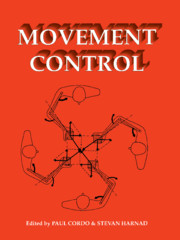Book contents
- Frontmatter
- Contents
- Preface
- 1 Does the nervous system use equilibrium-point control to guide single and multiple joint movements?
- 2 Does the nervous system depend on kinesthetic information to control natural limb movements?
- 3 Can sense be made of spinal interneuron circuits?
- 4 Implications of neural networks for how we think about brain function
- 5 Do cortical and basal ganglionic motor areas use “motor programs” to control movement?
- 6 Functional heterogeneity with structural homogeneity: How does the cerebellum operate?
- 7 Are movement parameters recognizably coded in the activity of single neurons?
- 8 The representation of egocentric space in the posterior parietal cortex
- Open Peer Commentary and Authors' Responses
- References
- Index
2 - Does the nervous system depend on kinesthetic information to control natural limb movements?
Published online by Cambridge University Press: 11 December 2009
- Frontmatter
- Contents
- Preface
- 1 Does the nervous system use equilibrium-point control to guide single and multiple joint movements?
- 2 Does the nervous system depend on kinesthetic information to control natural limb movements?
- 3 Can sense be made of spinal interneuron circuits?
- 4 Implications of neural networks for how we think about brain function
- 5 Do cortical and basal ganglionic motor areas use “motor programs” to control movement?
- 6 Functional heterogeneity with structural homogeneity: How does the cerebellum operate?
- 7 Are movement parameters recognizably coded in the activity of single neurons?
- 8 The representation of egocentric space in the posterior parietal cortex
- Open Peer Commentary and Authors' Responses
- References
- Index
Summary
Abstract: This target article draws together two groups of experimental studies on the control of human movement through peripheral feedback and centrally generated signals of motor commands. First, during natural movement, feedback from muscle, joint, and cutaneous afferents changes; in human subjects these changes have reflex and kinesthetic consequences. Recent psychophysical and microneurographic evidence suggests that joint and even cutaneous afferents may have a proprioceptive role. Second, the role of centrally generated motor commands in the control of normal movements and movements following acute and chronic deafferentation is reviewed. There is increasing evidence that subjects can perceive their motor commands under various conditions, but that this is inadequate for normal movement; deficits in motor performance arise when the reliance on proprioceptive feedback is abolished either experimentally or because of pathology. During natural movement, the CNS appears to have access to functionally useful input from a range of peripheral receptors as well as from internally generated command signals. The unanswered questions that remain suggest a number of avenues for further research.
Information
- Type
- Chapter
- Information
- Movement Control , pp. 12 - 30Publisher: Cambridge University PressPrint publication year: 1994
Accessibility standard: Unknown
Why this information is here
This section outlines the accessibility features of this content - including support for screen readers, full keyboard navigation and high-contrast display options. This may not be relevant for you.Accessibility Information
- 6
- Cited by
